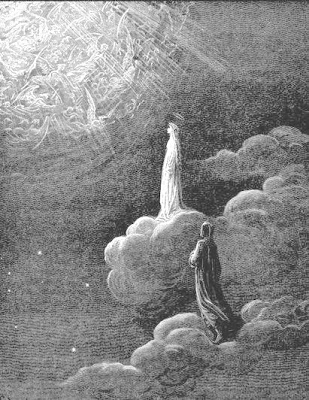Messiaen, Quatuor pour la fin du temps, Trio Wanderer, P. Moraguès (released July 8, 2008) Harmonia Mundi HMC 901987 |
R. Rischin, For the End of Time: The Story of the Messiaen Quartet |
Trio Wanderer, past winners of the ARD Competition in Munich, are joined here by the excellent Paul Moraguès, principal clarinetist of the Orchestre de Paris (and one-time teacher of Rebecca Rischin, who teaches the clarinet at Ohio University). The performance is expansive (total time of 51'25"), not afraid of the possible longueurs in the ecstatic details of many movements. In particular, their fifth movement ("Louange à l'Eternité de Jésus") emphasizes the eternity, appearing to take literally the marking Messiaen gave to it, "Infiniment lent, extatique" (an ecstatic and infinitely slow 10'48"). They round the disc out with a straightforward reading of one of Messiaen's few other chamber works, the Thème et variations for violin and piano, a love song offered to his first wife, the violinist Claire Delbos.
62'27"
Messiaen, Quatuor pour la fin du temps, Gould Piano Trio, R. Plane (released July 29, 2008) Chandos CHAN 10480 |
The clarinet, piano, and cello are about equal in quality between these two recordings, but Lucy Gould's violin on this disc is a notch or two less pure and searing in tone than Jean-Marc Phillips-Varjabédian's. Pianist Benjamin Frith gives a subtle touch by rendering the piano chords of the final movement as slightly demarcated trochees, accenting the first of each pair but not letting the second fade too much into the background. Although Gould and Frith's take on the Thème et variations here is less pleasing, the Chandos disc is made of greater interest because it opens with the first-ever recording of Messiaen's own piano arrangement of his orchestral work Les offrandes oubliées. Frith plays it with symphonic scope and a broad sense of color.
67'40"
 Beatrice and Dante in Paradiso, engraving by Gustave Doré |
"In His eternity, beyond time, beyond
any other limit, as it pleased Him,
in these new loves, Eternal Love unfolded.
Nor, before then, did He rest in torpor,
for until God moved upon these waters
there existed no 'before', there was no 'after'.
Form and matter, conjoined and separate,
came into being without defect,
shot like three arrows from a three-stringed bow.
And, as a ray shines right through glass, amber,
or crystal, so that between its presence
and its shining there is no lapse of time,
just so did the threefold creation flash --
with no intervals in its beginning --
from its Lord into being, all at once."
-- Beatrice tries to explain God's creation of the angels, before time began (Dante, Paradiso, Canto 29, trans. Robert Hollander)
No comments:
Post a Comment